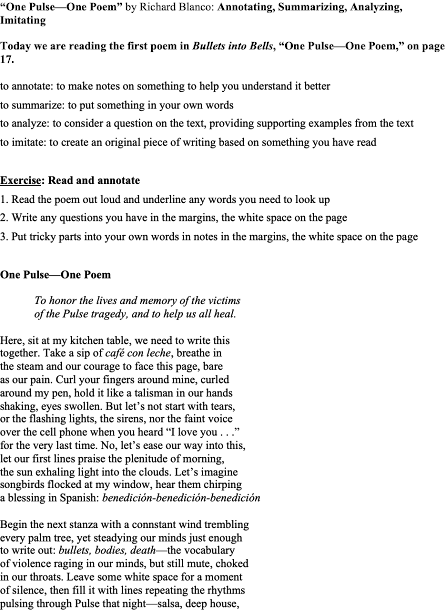Week 57: College Reading and Writing: Mary Szybist
Week 57: College Reading and Writing: Mary Szybist
Mary Szybist: Annotating, Summarizing, Analyzing, Imitating
to annotate: to make notes on something
to help you understand it better
to summarize: to put something in your
own words
to analyze: to consider a question on the
text, providing supporting examples from the text
to imitate: to create an original piece
of writing based on something you have read
Exercise: Read and annotate
1. Read the poem out loud and underline
any words you need to look up
2. Write any questions you have in the
margins or in your notebook
3. Put tricky parts into your own words
in notes in the margins or in your notebook
Exercise: Questions for comprehension of the poem
1. How does the “I” work in this poem?
2. What is the role of repetition in this
poem?
3. Who is the speaker in this poem? Why
is it important?
Exercise: Summarize the poem
Write a paragraph summarizing the poem
with quotations, in-text citation, and a Work Cited Page.
Example too-short summary, incorporating quotation and in-text
citation:
Brenda Hillman’s poem “The Family Sells the
Family Gun” tells the story of siblings getting rid of their father’s gun after
“his ashes...were lying” (87). The speaker questions what it means to own and
get rid of a gun in America, saying, “[w]e couldn’t take it to the cops even in
my handbag” (Hillman 88).
Work Cited Page (for today’s
poem)
Szybist, Mary. “Happy Ideas.” Poetry
Foundation, Poetry Foundation, 2018,
Exercise: Write a Response
The title
of the poem is “Happy Ideas”: are the ideas in this poem happy? Do the ideas
have any emotion? If yes, what? Do you agree with
Szybist that you should fake happiness till you make it? What does this poem
remind you of? Do you relate to this poem’s message? Why or why not?
Exercise: Analysis
Question for analysis: I think this poem
is about depression, acceptance, and the things that help time go by and
soothe. Jill thinks it’s about art, and what prompts us to make art. What do you think this poem is about?
Exercise: Imitation
Write a mantra poem. A mantra is a word,
or phrase, repeated to help concentration in meditation. Is there a word or
phrase that helps you relax? Maybe it is a name of a person, maybe it’s the
amount of time you have left in jail, maybe it’s the words to your favorite
song. You are the expert on you. Use elements from Szybist’s poem that you
admire to make your own poem stronger.
Homework:
1.
Summary of Poem
2.
Write a Response
3.
Analysis of Poem
4. Imitation of Poem
About this class:
Your notebooks belong to you; you can
write first drafts in them, and make notes for yourselves. To turn in homework, revise your work in a
blue book or sheets of paper you can get from your instructor. In this class,
you are welcome to submit homework for a grade. If it’s not strong enough to
earn an A, I’ll give you some comments to help you revise it, and let you do it
over again. You have as many chances as you want to complete and perfect the
work in this class, and you are welcome to do more than one week’s worksheet
for homework at a time; ask me for sheets you’ve missed. Students who complete
15 weeks of graded assignments and a longer paper can qualify for college
credit. When you get close to completing 15 weeks, I’ll help you get started on
your longer paper.
Happy
Ideas
BY MARY SZYBIST
I had the happy idea to fasten a bicycle
wheel
to
a kitchen stool and watch it turn.
—DUCHAMP
I had the happy idea to suspend some blue
globes in the air
and watch them pop.
I had the happy idea to put my little copper
horse on the shelf so we could stare at each other
all evening.
I had the happy idea to create a void in
myself.
Then to call it natural.
Then to call it supernatural.
I had the happy idea to wrap a blue scarf
around my head and spin.
I had the happy idea that somewhere a child
was being born who was nothing like Helen or
Jesus except in the sense of changing
everything.
I had the happy idea that someday I would find
both pleasure and punishment, that I would
know them and feel them,
and that, until I did, it would be almost as
good to pretend.
I had the happy idea to call myself happy.
I had the happy idea that the dog digging a
hole in the yard in the twilight had his nose deep in
mold-life.
I had the happy idea that what I do not
understand is more real than what I do,
and then the happier idea to buckle myself
into two blue velvet shoes.
I had the happy idea to polish the reflecting
glass and say
hello to my own blue soul. Hello, blue soul. Hello.
It was my happiest idea.


Comments
Post a Comment